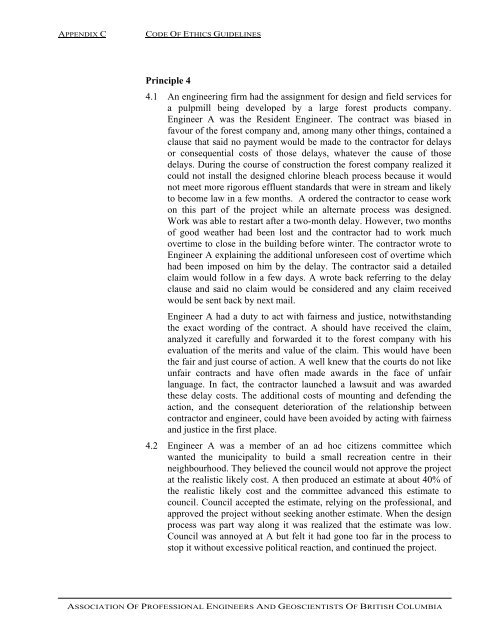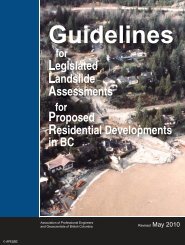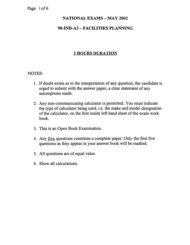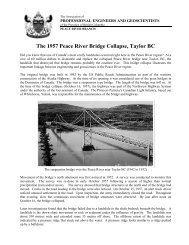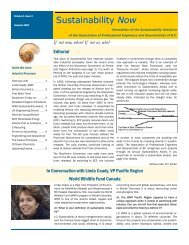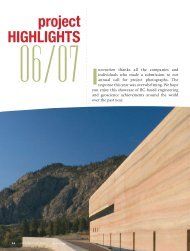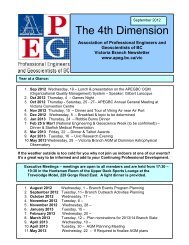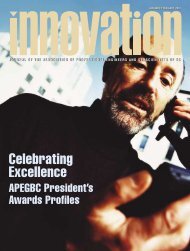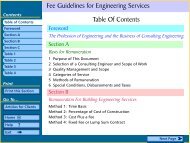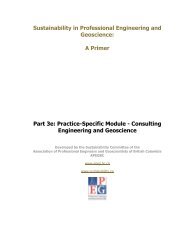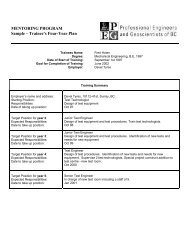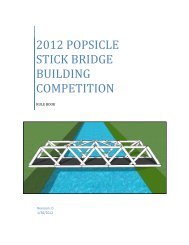Code of Ethics Guidelines - APEGBC
Code of Ethics Guidelines - APEGBC
Code of Ethics Guidelines - APEGBC
You also want an ePaper? Increase the reach of your titles
YUMPU automatically turns print PDFs into web optimized ePapers that Google loves.
APPENDIX C CODE OF ETHICS GUIDELINES<br />
Principle 4<br />
4.1 An engineering firm had the assignment for design and field services for<br />
a pulpmill being developed by a large forest products company.<br />
Engineer A was the Resident Engineer. The contract was biased in<br />
favour <strong>of</strong> the forest company and, among many other things, contained a<br />
clause that said no payment would be made to the contractor for delays<br />
or consequential costs <strong>of</strong> those delays, whatever the cause <strong>of</strong> those<br />
delays. During the course <strong>of</strong> construction the forest company realized it<br />
could not install the designed chlorine bleach process because it would<br />
not meet more rigorous effluent standards that were in stream and likely<br />
to become law in a few months. A ordered the contractor to cease work<br />
on this part <strong>of</strong> the project while an alternate process was designed.<br />
Work was able to restart after a two-month delay. However, two months<br />
<strong>of</strong> good weather had been lost and the contractor had to work much<br />
overtime to close in the building before winter. The contractor wrote to<br />
Engineer A explaining the additional unforeseen cost <strong>of</strong> overtime which<br />
had been imposed on him by the delay. The contractor said a detailed<br />
claim would follow in a few days. A wrote back referring to the delay<br />
clause and said no claim would be considered and any claim received<br />
would be sent back by next mail.<br />
Engineer A had a duty to act with fairness and justice, notwithstanding<br />
the exact wording <strong>of</strong> the contract. A should have received the claim,<br />
analyzed it carefully and forwarded it to the forest company with his<br />
evaluation <strong>of</strong> the merits and value <strong>of</strong> the claim. This would have been<br />
the fair and just course <strong>of</strong> action. A well knew that the courts do not like<br />
unfair contracts and have <strong>of</strong>ten made awards in the face <strong>of</strong> unfair<br />
language. In fact, the contractor launched a lawsuit and was awarded<br />
these delay costs. The additional costs <strong>of</strong> mounting and defending the<br />
action, and the consequent deterioration <strong>of</strong> the relationship between<br />
contractor and engineer, could have been avoided by acting with fairness<br />
and justice in the first place.<br />
4.2 Engineer A was a member <strong>of</strong> an ad hoc citizens committee which<br />
wanted the municipality to build a small recreation centre in their<br />
neighbourhood. They believed the council would not approve the project<br />
at the realistic likely cost. A then produced an estimate at about 40% <strong>of</strong><br />
the realistic likely cost and the committee advanced this estimate to<br />
council. Council accepted the estimate, relying on the pr<strong>of</strong>essional, and<br />
approved the project without seeking another estimate. When the design<br />
process was part way along it was realized that the estimate was low.<br />
Council was annoyed at A but felt it had gone too far in the process to<br />
stop it without excessive political reaction, and continued the project.<br />
ASSOCIATION OF PROFESSIONAL ENGINEERS AND GEOSCIENTISTS OF BRITISH COLUMBIA


